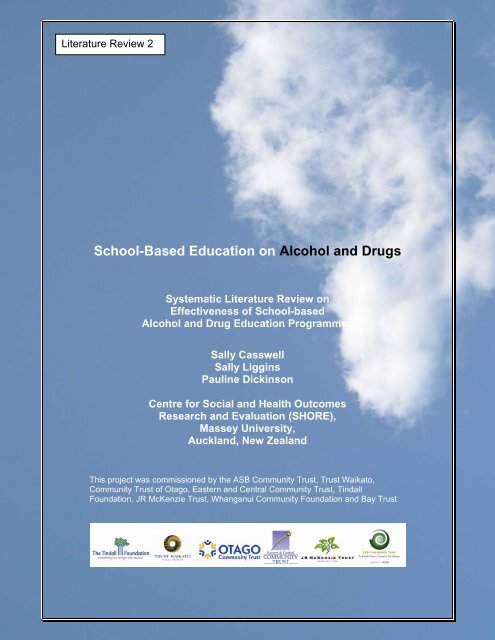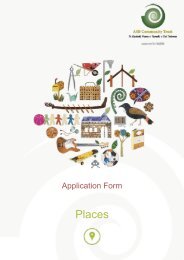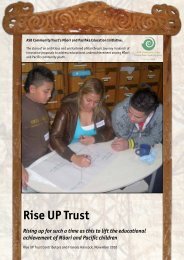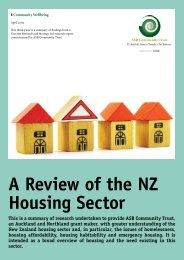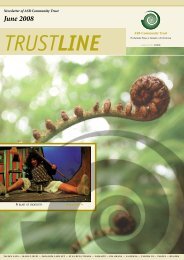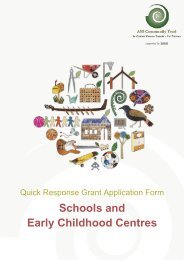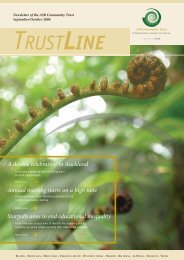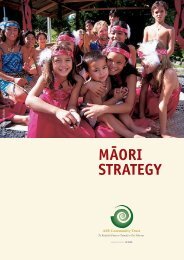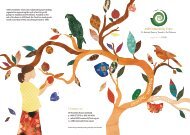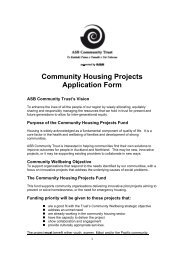School-Based Education on Alcohol and Drugs - ASB Community ...
School-Based Education on Alcohol and Drugs - ASB Community ...
School-Based Education on Alcohol and Drugs - ASB Community ...
You also want an ePaper? Increase the reach of your titles
YUMPU automatically turns print PDFs into web optimized ePapers that Google loves.
Literature Review 2<str<strong>on</strong>g>School</str<strong>on</strong>g>-<str<strong>on</strong>g>Based</str<strong>on</strong>g> <str<strong>on</strong>g>Educati<strong>on</strong></str<strong>on</strong>g> <strong>on</strong> <strong>Alcohol</strong> <strong>and</strong> <strong>Drugs</strong>Systematic Literature Review <strong>on</strong>Effectiveness of <str<strong>on</strong>g>School</str<strong>on</strong>g>-based<strong>Alcohol</strong> <strong>and</strong> Drug <str<strong>on</strong>g>Educati<strong>on</strong></str<strong>on</strong>g> ProgrammesSally CasswellSally LigginsPauline Dickins<strong>on</strong>Centre for Social <strong>and</strong> Health OutcomesResearch <strong>and</strong> Evaluati<strong>on</strong> (SHORE),Massey University,Auckl<strong>and</strong>, New Zeal<strong>and</strong>This project was commissi<strong>on</strong>ed by the <strong>ASB</strong> <strong>Community</strong> Trust, Trust Waikato,<strong>Community</strong> Trust of Otago, Eastern <strong>and</strong> Central <strong>Community</strong> Trust, TindallFoundati<strong>on</strong>, JR McKenzie Trust, Whanganui <strong>Community</strong> Foundati<strong>on</strong> <strong>and</strong> Bay Trust
SummarySystematic reviews of early interventi<strong>on</strong> drug <strong>and</strong> alcohol programmes c<strong>on</strong>cludedthat there was evidence of a small effect from some multi-comp<strong>on</strong>ent communityinterventi<strong>on</strong>s, no effect from the life-skills programmes, mixed but some positiveeffects <strong>on</strong> drug use of early interventi<strong>on</strong>, <strong>and</strong> little effect from family interventi<strong>on</strong>sapart from the Iowa Strengthening Families Programme (ISFP). The ISFP had beenevaluated l<strong>on</strong>g term <strong>and</strong> at six year follow up showed positive effects <strong>on</strong> reducingdrug use. Brief interventi<strong>on</strong> for drug use was found to have little effect <strong>on</strong> tobaccoc<strong>on</strong>sumpti<strong>on</strong>, but was effective in reducing alcohol c<strong>on</strong>sumpti<strong>on</strong> <strong>and</strong> multiplesubstance use.Focus of the reviewThere has been a focus <strong>on</strong> high quality studies that have been assessed asmethodologically sound, <strong>and</strong> that have measured health <strong>and</strong> behavioural changes.The studies included in the secti<strong>on</strong> <strong>on</strong> behaviour <strong>and</strong> health outcomes comprisedreviews undertaken by the Cochrane Collaborati<strong>on</strong> since 2000 <strong>and</strong> systematic orrobust meta-analyses. These provide the most robust basis available for identifyingeffectiveness as they are a state of the art distillati<strong>on</strong> <strong>and</strong> analysis of currentprogrammes.The sec<strong>on</strong>d secti<strong>on</strong> outlines the basis for the best practice principles for teaching <strong>and</strong>learning for alcohol <strong>and</strong> drugs programmes. This literature is useful in informingdevelopment of best practice guidelines for HOW to implement programmes, but is oflimited value in ascertaining the most effective programmes regarding l<strong>on</strong>ger termhealth <strong>and</strong> behavioural changesLiterature reviewed for this secti<strong>on</strong> was not subjectedto the same inclusi<strong>on</strong> criteria as literature covered in secti<strong>on</strong> <strong>on</strong>eFindingsThe reviews of primary preventi<strong>on</strong> programme evaluati<strong>on</strong>s c<strong>on</strong>clude that thec<strong>on</strong>siderable weight of evidence indicates little or no effect of school based drugeducati<strong>on</strong> programmes <strong>on</strong> actual drug use (White <strong>and</strong> Pitts, 1998, Foxcroft et al.,2006, Faggiano, 2005). These authors reported that strategies with a focus <strong>on</strong>shaping or changing individual behaviour through the promoti<strong>on</strong> of knowledge <strong>and</strong>skills have been largely ineffective in delaying or reducing drug use. Some reportshort-term impacts <strong>on</strong> behaviour, but these effects generally disappear over time(Faggiano, 2005, Foxcroft et al., 2006). Some programmes have also resulted in aharmful effect such as arousing curiosity which results in experimenting with drugs(Babor et al., 2003, Foxcroft et al., 2006). 1Babor et al’s (2003) findings are c<strong>on</strong>sistent with the above c<strong>on</strong>clusi<strong>on</strong>s. They notedthat while school based health educati<strong>on</strong> programmes based <strong>on</strong> values clarificati<strong>on</strong>,self-esteem, general social skills <strong>and</strong> ‘alternative’ approaches may increaseknowledge <strong>and</strong> influence young people’s attitudes toward alcohol <strong>and</strong> othersubstances, actual substance abuse am<strong>on</strong>g young people remained largelyunaffected. Programmes that provided resistance skills training <strong>and</strong> normative1 A recent systematic review of the grey literature <strong>on</strong> drug preventi<strong>on</strong> am<strong>on</strong>g young people c<strong>on</strong>ducted by McGrath<strong>and</strong> associates (2006) found that twenty-six of 209 reports reviewed were sufficiently robust to include in theanalysis. Findings were generally c<strong>on</strong>sistent with those reported in the white literature cited in this secti<strong>on</strong>.
educati<strong>on</strong> produced mixed results but with generally modest short-term effects.Booster sessi<strong>on</strong>s may improve effectiveness.Compared to the educati<strong>on</strong> approaches comm<strong>on</strong>ly used, those teaching generalsocial skills are the most likely to have some effect in determining early stage druguse (Faggiano, 2005). White <strong>and</strong> Pitts (1998) also pointed to the value of broadlybased generic social skills training, but in their findings, the more effectiveinterventi<strong>on</strong>s had both generic <strong>and</strong> specific social skills training comp<strong>on</strong>ents. It wasemphasised that social skills programmes need to take account of the social <strong>and</strong>psychological dimensi<strong>on</strong>s of young people <strong>and</strong> include addressing individual risk <strong>and</strong>protective factors associated with drug use (Faggiano, 2005).White <strong>and</strong> Pitts (1998) also note that booster sessi<strong>on</strong>s al<strong>on</strong>g with sufficient intensityof the programme may increase the chance of an effect, but these factors did notguarantee effectiveness. They also reported some effectiveness of ‘booster sessi<strong>on</strong>s’that were not school based but reinforced preventi<strong>on</strong> messages to young people.Examples cited were community or mass media comp<strong>on</strong>ents as well as <strong>and</strong> anintegrated school <strong>and</strong> community level interventi<strong>on</strong> where the community levelcomp<strong>on</strong>ent was essential to the effectiveness.In reviewing alcohol preventi<strong>on</strong> programmes, Foxcroft et al. (2006) found it difficult todraw any c<strong>on</strong>clusi<strong>on</strong>s regarding effectiveness from interventi<strong>on</strong>s that had <strong>on</strong>ly shortterm follow-up <strong>and</strong> found almost no evidence of effectiveness in interventi<strong>on</strong>s withmedium term follow-up. They therefore focused particularly <strong>on</strong> programmeevaluati<strong>on</strong>s that were three years or l<strong>on</strong>ger. While noting problems with limitednumbers of studies <strong>and</strong> somewhat mixed results, they c<strong>on</strong>clude that communityacti<strong>on</strong> projects were promising <strong>and</strong> highlight the theoretical robustness of communitylevel interventi<strong>on</strong>s versus a focus <strong>on</strong> individual change through educati<strong>on</strong>programmes. The results of <strong>on</strong>e community acti<strong>on</strong> initiative cited showed significantreducti<strong>on</strong>s in alcohol related harm across a metropolitan community (Holder 1997cited in Foxcroft et al., 2006)). Foxcroft et al. (2006) highlights that community levelinterventi<strong>on</strong>s can shift the potential benefit bey<strong>on</strong>d young people at school, to includethe whole populati<strong>on</strong>. They also point out the potential cost effectiveness of targetingcommunity level change through policy <strong>and</strong> envir<strong>on</strong>mental measures, rather thanindividual change.However, with regard to educati<strong>on</strong> programmes, Foxcroft et al. (2006) also noted thatskills training programmes designed to be culturally specific also showed somepromise of improved effectiveness over general programmes. (Schinke 2000 cited inFoxcroft et al., 2006). The programme cited included school based cognitive <strong>and</strong>behavioural skills development <strong>and</strong> also had a focus <strong>on</strong> cultural values, holisticc<strong>on</strong>cepts of health <strong>and</strong> Native American history which were seen as an importantpart of the programme. A community comp<strong>on</strong>ent was included in <strong>on</strong>e arm of theprogramme. This involved media <strong>and</strong> posters <strong>and</strong> meetings for parents, communitymembers <strong>and</strong> teachers, but no additi<strong>on</strong>al effect of this comp<strong>on</strong>ent could be shownover <strong>and</strong> above the school based comp<strong>on</strong>ent. Drug use (except tobacco) was lowerfor the interventi<strong>on</strong> than the c<strong>on</strong>trol group at the 3.5 years follow up measure.Foxcroft et al. (2006) recommended further evaluati<strong>on</strong> of culturally specificprogrammes. White <strong>and</strong> Pitts (1998) also emphasised that to increase effectiveness,programme designs needed to be better customised to meet the differing cultural,drug-use stage <strong>and</strong> other needs of young people.In summary, the evidence for effectiveness of school-based primary preventi<strong>on</strong>programmes is at the very best, mixed, with the c<strong>on</strong>siderable weight of evidenceindicating little or no effect <strong>on</strong> drug use (White <strong>and</strong> Pitts, 1998, Foxcroft et al., 2006,
Faggiano, 2005). There is however both theoretical <strong>and</strong> evaluati<strong>on</strong> evidence for theeffectiveness of community acti<strong>on</strong> initiatives to reduce alcohol related harm inmultiple settings at an integrated school/community level. They may or may notinclude a school based comp<strong>on</strong>entGates et al (2006) c<strong>on</strong>ducted a systematic review of interventi<strong>on</strong>s for preventi<strong>on</strong> ofdrug use by young people. Some of these included school based comp<strong>on</strong>ents.Interventi<strong>on</strong>s were either educati<strong>on</strong> <strong>and</strong> skills training, brief interventi<strong>on</strong>/motivati<strong>on</strong>alinterviewing, family interventi<strong>on</strong>s or multi comp<strong>on</strong>ent community interventi<strong>on</strong>s. Therewas evidence of small effect from some of the multi-comp<strong>on</strong>ent communityinterventi<strong>on</strong>s, no effect from the life-skills programmes, mixed but some positiveeffects <strong>on</strong> drug use of brief interventi<strong>on</strong>, <strong>and</strong> apart from the Iowa StrengtheningFamilies Programme (ISFP), little effect from family interventi<strong>on</strong>s. In summary, whilea small number of programmes reviewed showed a weak effect <strong>on</strong> drug use,methodological issues in many of the studies, <strong>and</strong> the relatively small number ofstudies robust enough to be included meant that it was difficult to assert any effect.The Iowa Strengthening Families Programme (ISFP) was noted by both Gates(2006) <strong>and</strong> Foxcroft (2006) as a programme which had been evaluated l<strong>on</strong>g term <strong>and</strong>at six year followup showed positive effects <strong>on</strong> reducing drug use. ISFP is a multicomp<strong>on</strong>ent family skills training programme which includes parent skills training,children skills training <strong>and</strong> family life skills training. To date, there has been <strong>on</strong>ly <strong>on</strong>eevaluati<strong>on</strong> of this programme <strong>and</strong> further evaluati<strong>on</strong> is recommended to validateISFP’s effects <strong>and</strong> replicability (Gates, 2006; Foxcroft, 2006).Early Interventi<strong>on</strong> ProgrammesFinally, Tait et al (2003) systematically reviewed the evidence for the effectiveness ofbrief interventi<strong>on</strong> (BI) in reducing drug use in adolescents. Results showed that BIhad a small effect <strong>on</strong> alcohol c<strong>on</strong>sumpti<strong>on</strong> <strong>and</strong> a lessor effect <strong>on</strong> tobaccoc<strong>on</strong>sumpti<strong>on</strong>. In c<strong>on</strong>trast to these effects there was a significant effect <strong>on</strong> multiplesubstances use, but generalisati<strong>on</strong> of this result requires a little cauti<strong>on</strong> as samplesizes were small.C<strong>on</strong>clusi<strong>on</strong>It is clear from the literature reviewed that there is little if any effect of universal drug<strong>and</strong> alcohol educati<strong>on</strong> programmes <strong>on</strong> young people’s alcohol <strong>and</strong> drug use <strong>and</strong> hteeis some evidence for small effects <strong>on</strong> l<strong>on</strong>g term drug use of alcohol <strong>and</strong> drug earlyinterventi<strong>on</strong> programmes.Best Practice Principles, based <strong>on</strong> the literature <strong>and</strong> key policy <strong>and</strong>guidelines documentsIntroducti<strong>on</strong>(Cuijpers, 2002) highlights that a plethora of programmes are often promoted toschools <strong>and</strong> the lack of effectiveness of most makes it difficult for schools to select<strong>and</strong> implement effective programmes. He also asserts that there are not adequatecriteria available to assist schools in determining which programmes or approachesare harmful or ineffective, <strong>and</strong> which are more promising. In the New Zeal<strong>and</strong>c<strong>on</strong>text, the Ministry of Youth Development (2004) has recently developed bestpractice guidelines <strong>on</strong> drug educati<strong>on</strong> Strengthening Drug <str<strong>on</strong>g>Educati<strong>on</strong></str<strong>on</strong>g> in <str<strong>on</strong>g>School</str<strong>on</strong>g>Communities. These have provided a sound basis for the development of best
practice principles for this project. While the principles below are largely based <strong>on</strong>those outlined in the guidelines, they have been adapted slightly to include someother principles identified in the literature reviewed. .Best Practice Principles for Effective C<strong>on</strong>texts for <str<strong>on</strong>g>School</str<strong>on</strong>g> <str<strong>on</strong>g>Based</str<strong>on</strong>g> Programmes1. This is based <strong>on</strong> evidence of what works in terms of behavioural <strong>and</strong> healthoutcomes2. Programme formulated in the c<strong>on</strong>text of evidence for effectiveness ofstrategies at the level of the wider, social, cultural <strong>and</strong> ec<strong>on</strong>omic envir<strong>on</strong>ment3. Co-ordinated with other community initiatives eg community acti<strong>on</strong> projects4. Part of a comprehensive school wide approach to student well being5. Integrates with <strong>and</strong> supports a comprehensive health educati<strong>on</strong> programmedelivered by the school’s health educati<strong>on</strong> teachers6. Teachers/facilitators get adequate training <strong>and</strong> support7. Programmes are regularly <strong>and</strong> effectively evaluated8. Uses interactive teaching methods9. Teaches social skills10. Encourages critical analysis of wider social <strong>and</strong> ec<strong>on</strong>omic factors affectinghealth, including media <strong>and</strong> marketing11. Provides opportunities for good relati<strong>on</strong>ships <strong>and</strong> fosters c<strong>on</strong>nectedness12. Is implemented as intended (fidelity) 213. Ensures delivery is by educators that have the respect of/are acceptable tothe students14. Programme is of a durati<strong>on</strong> <strong>and</strong> intensity to be effective315. Realistic goals <strong>and</strong> clear aims <strong>and</strong> objectives16. Provides age appropriate, accurate <strong>and</strong> relevant factual informati<strong>on</strong>17. Supported by involving families/whanau18. Is l<strong>on</strong>g term <strong>and</strong> delivered over several years19. Relevant to students <strong>and</strong> have their input20. Resp<strong>on</strong>sive to different cultural views <strong>and</strong> realitiesEarly Inventi<strong>on</strong> (extra criteria)1. Evidence based effective targeted approaches that are accessible, safe <strong>and</strong>appropriate2. Provides opportunities for good relati<strong>on</strong>ships <strong>and</strong> fosters c<strong>on</strong>necti<strong>on</strong>s2 A critical issue to c<strong>on</strong>sider in programme evaluati<strong>on</strong> is the measurement of the fidelity of aprogramme’s implementati<strong>on</strong> (i.e., how well <strong>and</strong> how reliably the programme is implemented) (Hansen,2002, McC<strong>on</strong>ney et al., 2002). Evaluati<strong>on</strong> literature has highlighted factors such as experiential trainingof facilitators/teachers so that they are able to rehearse the c<strong>on</strong>tent of the programme <strong>and</strong> have acompetent skill base to implement the programme well <strong>and</strong> the provisi<strong>on</strong> of a clearly articulated manualas assisting in achieving fidelity (references).3 The drug, alcohol <strong>and</strong> mental health literature has highlighted that more positive findings have beenachieved when universal, classroom programmes have some intensity <strong>and</strong> are offered over an extendedtimeframe. This enables the programme to build <strong>on</strong> skills development <strong>and</strong> increase knowledge <strong>and</strong>experience over a number of years (Midford, 2002; Hawthorne, 2001; Tobler, 2000).


